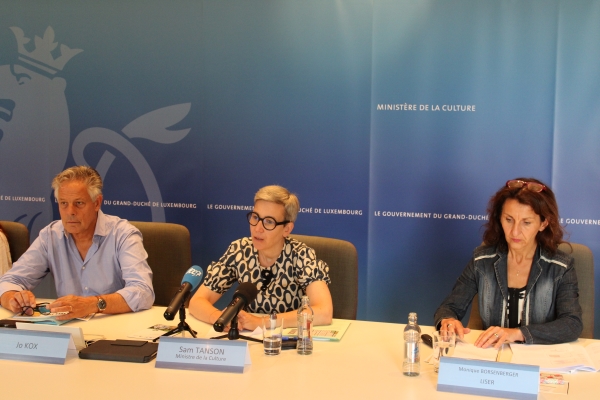 (L-R) Jo Kox, Ministry of Culture; Sam Tanson, Minister of Culture; Monique Borsenberger, LISER;
Credit: MCULT
(L-R) Jo Kox, Ministry of Culture; Sam Tanson, Minister of Culture; Monique Borsenberger, LISER;
Credit: MCULT
On Thursday 21 July 2022, Luxembourg's Minister of Culture, Sam Tanson, presented the results of the survey on museum practices in Luxembourg, launched in 2021 with the Luxembourg Institute of Socio-Economic Research (LISER).
The survey, which falls within the context of the implementation of the "Kulturentwécklungsplang" 2018-2028, in particular recommendations No. 10: "Setting up a cultural studies and statistics unit" and No. 47: "Carry out a survey on cultural practices culture of the country with a periodicity of ten years: 1999, 2009, 2019, ...", draws up an inventory of the museum practices of the Luxembourg population during the reference period March 2019 to March 2020, while identifying the needs of the public or the difficulties that would prevent part of the population from visiting the country's museums.
Minister Tanson recalled the objectives underlying this study: "The goals pursued by this ministry in museum and cultural policy are ambitious: to strengthen the development and transmission of museum funds, to guarantee real access to culture for all, to promote cultural mediation, to include people who are a priori the most remote from culture. These are objectives that presuppose a thorough knowledge of the target audiences and their needs. Through this study, we are therefore taking an important and essential step towards a future adaptation of development and support systems for the museum sector".
The survey shows that the public interest of heritage sites and museums has been constantly increasing since 1999. Overall, the public visitors of museums goes as much to Luxembourg museums as to foreign museums. Luxembourg museums are also acclaimed by more than eight out of ten visitors for their quality.
Large participation gaps distinguish most museum-related practices and the most privileged social categories make up the public visitors of museums to a greater extent. Sociodemographic factors such as educational level, socio-professional category and income remain strong determinants of museum visits.
The association still observed between schooling and museum attendance in adulthood reveals the role of habits acquired in childhood, both within the family and at school. The possibilities of reduced-price entry to museums in Luxembourg, as well as digitalisation and free access to a large number of online museums, do not make up for the lack of habits acquired during childhood.
The full report "Museum Audiences in 2020" and its summary is available online via the website of the Ministry of Culture at https://gd.lu/bSkslT and https://gd.lu/9p6wkX, respectively.








